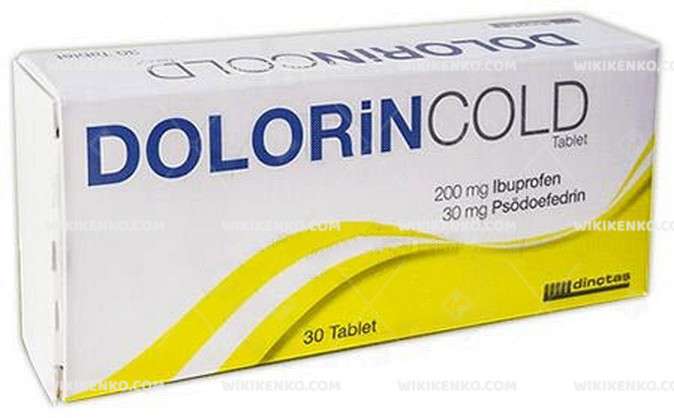Dolorin Cold Tablet
Dolorin Cold is an effective medication that can provide relief for a variety of cold symptoms. Whether you’re experiencing minor aches and pains, congestion, or fever, this medication can help alleviate discomfort and get you back on your feet. However, as with any medication, it’s important to follow the recommended dosage and speak with your doctor if you experience any side effects. With the right care and treatment, you can recover from your cold or flu and get back to your daily routine.
| Potency | Combined |
|---|---|
| Manufacturer | |
| Origin | |
| Generic Name (Ingredient) | Ibuprofen 200 Mg Pseudoephedrine Hydrochloride 30 Mg |
Assuming your emergency circumstances for this product, visit Urgent Quotation page. Besides, for any pharmaceutical questions, please ask us in the comments section.
Description
Dolorin Cold Tablet Usage
Dolorin Cold is a versatile medication that can be used to treat a variety of conditions. It is commonly used for minor aches and pains associated with the common cold, as well as headaches, back or muscle aches, menstrual cramps, or arthritis. Additionally, it can also be used to reduce fever, which is a common symptom of a cold or flu.
How it Works
The active ingredient Ibuprofen is a nonsteroidal anti-inflammatory drug (NSAID) that has pain-relieving and fever-reducing properties. It works by blocking the production of certain chemicals in the body that cause inflammation, thereby reducing pain and fever. The other active ingredient, Pseudoephedrine, is a decongestant that helps relieve congestion in the nose and sinuses. It works by narrowing the blood vessels in these areas, reducing swelling and allowing for easier breathing.
Side Effects
As with any medication, Dolorin Cold may cause side effects. However, not everyone who takes the medication will experience them. Some common side effects of Dolorin Cold include dry mouth, increased heart rate, and restlessness. If you experience any of these side effects, it’s important to speak with your doctor or pharmacist.
Dosage
The recommended dosage of Dolorin Cold varies depending on the condition being treated. For mild to moderate pain in adults and children over 12 years old, the usual dose is 400 mg every 6 hours or as needed. For arthritic pain, the dosage range is from 0.9 to 2.4 g per day, usually taken as 400 mg 3-4 times per day. For dysmenorrhea, or menstrual cramps, the recommended dose is 400 mg every 4 hours or as needed.
It’s important to follow the instructions provided by your doctor or pharmacist when taking Dolorin Cold. Do not exceed the recommended dose.
Dosage
| Use | Dosage |
|---|---|
| Adults/children 12+ | 400 mg every 6 hours as needed |
| Arthritic pain | 400 mg 3-4 times daily |
| Menstrual cramps | 400 mg every 4 hours as needed |
Conclusion
In summary, Dolorin Cold is a medication that can provide relief for a variety of symptoms caused by the common cold, including pain, fever, and congestion. Its active ingredients, Ibuprofen and Pseudoephedrine, work together to alleviate discomfort and promote easier breathing.
As with any medication, it’s important to follow the recommended dosage and speak with your doctor if you experience any side effects.
2 reviews for Dolorin Cold Tablet
Use the form below to report an error
Please answer the questions as thoroughly and accurately as possible. Your answers will help us better understand what kind of mistakes happen, why and where they happen, and in the end the purpose is to build a better archive to guide researchers and professionals around the world.
The information on this page is not intended to be a substitute for professional medical advice, diagnosis, or treatment. always seek the advice for your physician or another qualified health provider with any questions you may have regarding a medical condition. Always remember to
- Ask your own doctor for medical advice.
- Names, brands, and dosage may differ between countries.
- When not feeling well, or experiencing side effects always contact your own doctor.
Cyberchondria
The truth is that when we’re sick, or worried about getting sick, the internet won’t help.
According to Wikipedia, cyberchondria is a mental disorder consisting in the desire to independently make a diagnosis based on the symptoms of diseases described on Internet sites.
Why you can't look for symptoms on the Internet
If diagnoses could be made simply from a textbook or an article on a website, we would all be doctors and treat ourselves. Nothing can replace the experience and knowledge of specially trained people. As in any field, in medicine there are unscrupulous specialists, differences of opinion, inaccurate diagnoses and incorrect test results.




Diane smythe –
These are the best cold tablets I have ever tried , they give relief straight away .
Medical Guidance Center –
Hello Diane, this is Wikikenko
Dolorin Cold Tablet is a medicine that contains ibuprofen and pseudoephedrine as active ingredients. It is used to treat fever, pain, cold, flu, sinusitis and other conditions. It is taken by mouth and comes in 10, 24 or 30 tablet packs.
Dolorin Cold Tablet works by inhibiting an enzyme that produces substances that cause inflammation, pain, fever and swelling. Some possible side effects of Dolorin Cold Tablet are dryness in mouth, increased heart rate, restlessness or skin rash, wheezing, trouble breathing. The dosage of Dolorin Cold Tablet depends on your age, weight and condition. You should follow the instructions on the label or consult your doctor before taking it.
Leyla –
merhaba.bu ilaci 4 gun boyunca gunde 2 kere kabul edulse.kalp rahatsizligi olan biri ucun ölume sebeb ola bilirmi ?
Medical Guidance Center –
Hello Leyla, this is Wikikenko
Thank you for your question seeking more information about the safety of Dolorin Cold Tablet for those with heart conditions. While the medication contains common active ingredients used to relieve cold/flu symptoms, its potential side effects require careful consideration.
For individuals with heart issues, both ibuprofen and pseudoephedrine hydrochloride could pose risks. Ibuprofen has been shown to worsen certain heart conditions in some cases by increasing blood pressure and strain on the heart. Pseudoephedrine hydrochloride works by constricting blood vessels and may increase heart rate for those already at risk.
Whether death could result would depend on several individual factors like medical history, current health status, and dosage/duration of use. However, it is generally not advisable for those with heart disease to use such decongestants without medical supervision due to this elevated risk. As with any medication, consulting a doctor is strongly recommended to discuss alternative treatment options or safe usage guidelines based on one’s specific condition.
I hope this information helps address your concerns. Please let me know if you need any part of the explanation clarified further.